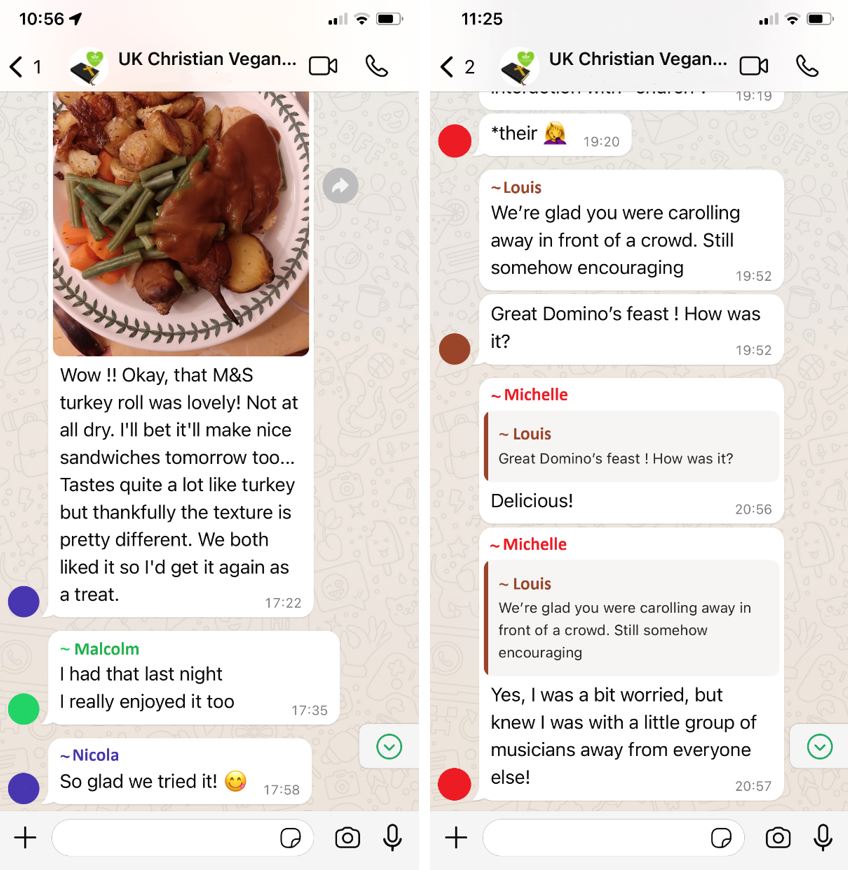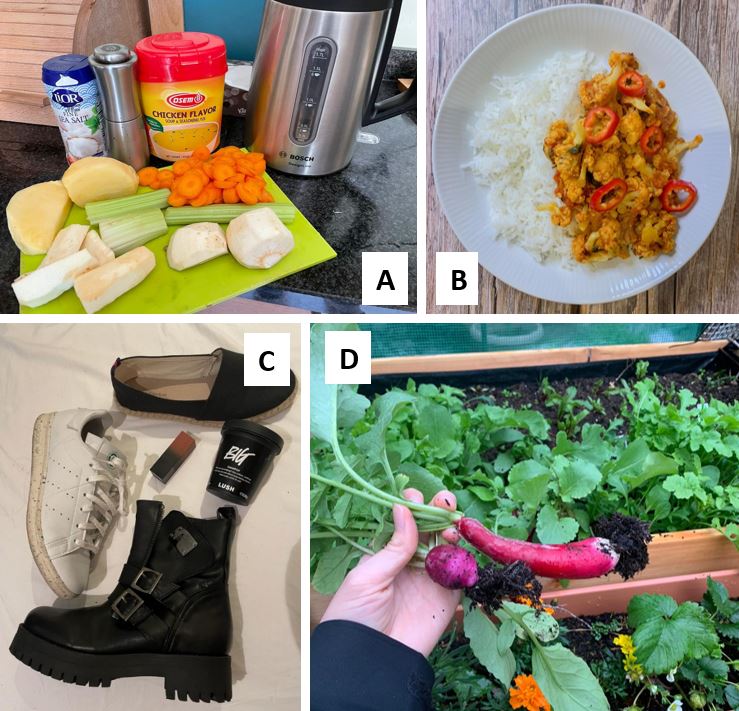Social Media Based Diary Methods
Presenter(s): Ellie Atayee-Bennett

Diary methods constitute a research method that allows a researcher to collect qualitative data relating to a participant’s everyday life over a set period of time. They are multi-modal and can be conducted in multiple creative ways, for example by using pen and paper diaries, specific diary apps, or as this resource will discuss, social media platforms. Diary methods can both complement other methods, such as interviews, or be a main method in itself. Resultingly, they are a valuable, but often overlooked, tool in the researcher’s toolkit.
Using Social Media Based Diary Methods
Diaries are excellent for exploring everyday experiences, and can be centred around a theme, for example food, fitness, spending habits, and daily behaviours. In my research, I focused on Muslim, Jewish, and Christian vegans, and made use of diary methods to explore foods consumed, purchases made, and regular activities that constituted the “faith vegan experience”. Social media is a particularly useful tool for conducting diary methods, as participants are likely already familiar with the platform(s) and use them regularly.
There are many different social media platforms where participants can write text entries, share photos, record audio, take videos, and even add emojis and GIFs. Whilst there are various ways participants can record their diary entries on social media, different platforms often promote different media types. For example, diaries could be conducted like so:
- Diary entries and group discussions on private WhatsApp groups, Facebook groups or Messenger chats
- Photos or reels on a personal Instagram account
- Mini blogs on X (formerly Twitter) or Threads
- Vlogs on TikTok.
The examples in the first bullet point are private and typically controlled by the researcher, so only approved participants can access these spaces, rendering ethical considerations more straight-forward. The bottom three however are typically, but not always, public spaces and controlled by the participant, which can change the dynamic and affect anonymisation, so ethical consideration is essential. In my research, I created three WhatsApp diary groups: one for Muslim vegans, one for Jewish vegans, and one for Christian vegans. These groups lasted for three months and coincided with a major religious festival for each faith group. In this way, I benefited from three months of diary entries, as well as three months of group discussions and interactions.
The Benefits
Diaries offer more accurate insight into daily life, capturing the specifics of practices, activities, feelings, and experiences. Where participants share data in real time, reporting is not reliant on memory, so diaries are a useful tool for exploring repetitive behaviours, such as eating, that would otherwise be challenging to track. This further improves the accuracy and reliability of the data, all the while enabling the researcher to both acquire a fuller picture of the ‘everyday’ and explore how experiences change over time.
Social media platforms are free to use and participants are generally already familiar with the technology. Social media also allows for some researcher presence which is particularly useful for encouraging participant engagement, as well as facilitating timely data analysis as the researcher can access the diary entries as soon as they are posted. If diaries are conducted in a group, such as a WhatsApp or Facebook group, there can be the added benefit of group discussion, as well as access to group interactions. Participants can also encourage each other to contribute more, which in turn can enrich the study further.
Some examples of Christian vegan group participant interactions, showing diary entries, are shown in the screenshots below (screenshots were collected in December 2021):

(All names in the screenshots above are pseudonyms.)
Social media based diaries can incorporate multiple media types, each of which offers benefits of its own:
- Audio recordings can be quicker and easier for participants, with the fluidity of speech increasing authenticity and depth. The researcher can also analyse tone, emphasis, and emotion, thereby acquiring additional insight.
- Photos offer a quick and convenient way of recording information, providing the researcher with a fuller understanding of the context than a text entry would; see some examples below.
- Videos can be a good choice where insights such as emotions, body language, and movement are important. They also provide greater contextual insight, and are an excellent choice for demonstrations, as these can be done more easily via video than any other format.
In the screenshots below:
A – a Jewish participant’s ingredients for chickenless soup, Summer 2021.
B – a Muslim participant’s dinner, Spring 2021.
C – a Jewish participant’s recent purchases, Autumn 2021.
D – a Muslim participant’s home garden, Spring 2021.

Key Considerations
Since diary methods take time, it can be challenging to recruit participants who are willing and able to keep a diary in the format and for the length of time required. To acquire commitment and facilitate recruitment, it is therefore helpful if the study is not too long. In my study, I opted for three months, as this allowed for the capture of both a religious festival and the everyday, all the while being manageable for participants. Linked to this, another limitation can be maintaining engagement, as participants are rarely in the habit of keeping a diary. Social media can help with this as the researcher can maintain a quiet presence, share gentle reminders, and build rapport with the participants. When my groups started to get quiet, I would ask a question or share a list of diary entry ideas to encourage participants to contribute more. For diaries to be successful therefore, they rely on diarists to be self-disciplined or for the researcher to engage lightly with the participants.
Diarists could be selective with what they share, choosing only to post things that they think the researcher wants, so there is a possibility of missing out on valuable information relevant to the research. Clear communication during recruitment can help to mitigate this. Diaries also encourage participant reflexivity, and whilst this can increase the depth and quality of the data being collected, it can also arouse emotion in the case of sensitive topics. It is therefore important for the researcher to communicate this potentiality during the recruitment stage, as well as maintain a safe space for participants.
Each medium can also come with its own considerations and challenges. For all media types, it is important to transcribe and analyse promptly, so as to avoid the risk of data loss. Where audio and video diaries are concerned, privacy can be an issue, whilst risks to anonymity could result if participants feature themselves or any identifying information in videos and photos. Further, some participants may not be comfortable with certain options, such as filming themselves, so offering choice and flexibility will help with recruitment and participant engagement.
Planning Social Media Based Diary Methods
You will want to consider which social media platform(s) to use, what media you want participants to provide, what time frame you will set, what research question or topics you want to explore, and how structured or unstructured the diary will be. For example, will you ask participants to submit diary entries at regular, predetermined intervals, anytime a particular event or experience takes place, whenever you contact them, or a mixture?
> Download worksheet to help you develop a diary plan and guidelines for participants.
> Download extract sample from WhatsApp group chat.
About the author
Ellie Atayee-Bennett is a final year doctoral researcher in the Department of Sociology at the University of Southampton, funded by an ESRC South Coast DTP studentship. Her PhD research explores the lived experiences of Muslim, Jewish, and Christian vegans in the UK, and introduces to scholarship ‘faith veganism’, denoting a nuanced experience where religiosity intersects and underpins ethical veganism. In her study, she employs multiple qualitative methods, namely interviews, social media based diary methods, and virtual participant observation.
- Published on: 29 January 2024
- Event hosted by: Southampton
- Keywords: Social media | diary methods | qualitative research | photo-elicitation | audio | video |
- To cite this resource:
Ellie Atayee-Bennett. (2024). Social Media Based Diary Methods. National Centre for Research Methods online learning resource. Available at https://www.ncrm.ac.uk/resources/online/all/?id=20838 [accessed: 26 December 2025]
⌃BACK TO TOP


